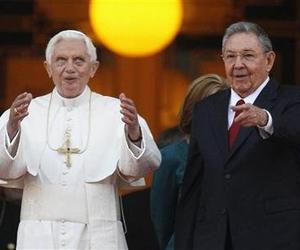Cuban government reaffirms its political model to the Pope's visit
- Submitted by: Luis Manuel Mazorra
- Culture and Traditions
- 03 / 28 / 2012

Marino Murillo, vice president of the Council of Ministers reaffirmed that the socialist political model that exists on the island is not subject to any discussion or changes. The economic model is the only sector that is receiving changes.
The trip of Pope Benedict XVI, who arrived on the island on Monday in a three-day visit, raised expectations that the Church can help build a more open society on the island, where a governing party system and all means State media are.
However, Murillo said the plan more than 300 reforms undertaken by President Raul Castro will continue aimed at making the rigid Soviet-style centralized to ensure the survival of Marxist ideology in the country and not be extended in any way the policy area.
"In Cuba there will be no political reform. In Cuba we are talking about updating the Cuban economic model that makes our socialism sustainable," he said in a conference with foreign journalists arrived to cover the visit of His Holiness.
The reforms have allowed Cubans for the first time since the triumph of the revolution in 1959 freely buy and sell houses and cars, buy land to grow and expand private enterprise in areas such as tourism and hospitality industry.
Pope's visit came a front preceded by statements about the failure of communism in Cuba and an offer for the Church to help the authorities to seek "without trauma" new ways and models to move towards a more open society.
"Everyone who comes to Cuba to help update our economic model, really comes to help and not to impose things, so be it. We are ready to review it," Murillo said, reiterating that any changes will always be under the premise of maintaining the socialism.
"We looked at what you are doing around the world but we will update our model with good features Cuban socialism," the former Minister of Economy, arguing that the government is closely monitoring changes in several countries like Russia, Vietnam or China.
Pope lowered the tone of his words in Santiago de Cuba, but insisted the multitudinous Mass celebrated in that city that Cubans must build a new society more open and fair with the "essential" support of the Church.
The historic meeting between the late John Paul II and former President Fidel Castro in 1998 ended decades of hostility between the Communist Party and the Church, which became the second most influential institution in the country and main interlocutor of the government on sensitive issues as human rights and political freedoms.
Dissident groups of the island, accused by the Government of being mercenaries in the pay of the United States to destabilize the revolution, are skeptical about the possible timing of economic change official.
"There will be no place in the economic reform, much less in the system of laws and civil and political liberties," said Elizardo Sanchez, spokesman for the illegal but tolerated Cuban Commission for Human Rights (CCHR).
Opponents are frustrated because they got an audience with His Holiness to transfer his claims of violation of human rights, ensuring that the authorities will show a skewed Cuban reality.
Benedict, who arrived in Havana later meet with Raul Castro. It is still unclear if they also meet with Fidel or his ally Hugo Chavez, who is in Cuba to receive radiation therapy as a treatment against cancer that was diagnosed last year.
Comments